法律知识导读(英文)第十四单元 H. L. A. Hart
法律英语知识点归纳
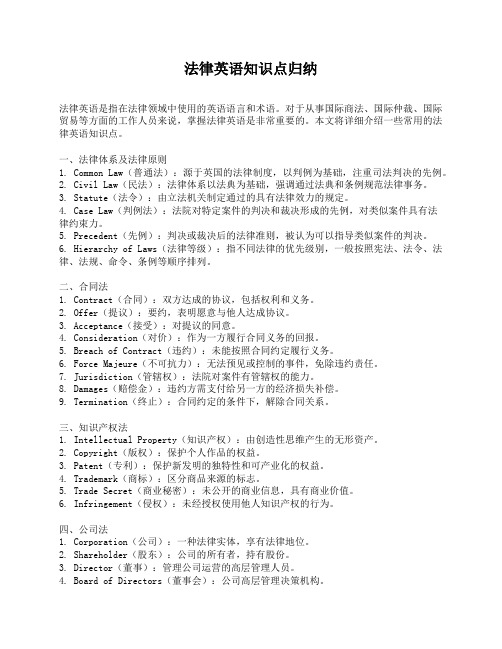
法律英语知识点归纳法律英语是指在法律领域中使用的英语语言和术语。
对于从事国际商法、国际仲裁、国际贸易等方面的工作人员来说,掌握法律英语是非常重要的。
本文将详细介绍一些常用的法律英语知识点。
一、法律体系及法律原则1. Common Law(普通法):源于英国的法律制度,以判例为基础,注重司法判决的先例。
2. Civil Law(民法):法律体系以法典为基础,强调通过法典和条例规范法律事务。
3. Statute(法令):由立法机关制定通过的具有法律效力的规定。
4. Case Law(判例法):法院对特定案件的判决和裁决形成的先例,对类似案件具有法律约束力。
5. Precedent(先例):判决或裁决后的法律准则,被认为可以指导类似案件的判决。
6. Hierarchy of Laws(法律等级):指不同法律的优先级别,一般按照宪法、法令、法律、法规、命令、条例等顺序排列。
二、合同法1. Contract(合同):双方达成的协议,包括权利和义务。
2. Offer(提议):要约,表明愿意与他人达成协议。
3. Acceptance(接受):对提议的同意。
4. Consideration(对价):作为一方履行合同义务的回报。
5. Breach of Contract(违约):未能按照合同约定履行义务。
6. Force Majeure(不可抗力):无法预见或控制的事件,免除违约责任。
7. Jurisdiction(管辖权):法院对案件有管辖权的能力。
8. Damages(赔偿金):违约方需支付给另一方的经济损失补偿。
9. Termination(终止):合同约定的条件下,解除合同关系。
三、知识产权法1. Intellectual Property(知识产权):由创造性思维产生的无形资产。
2. Copyright(版权):保护个人作品的权益。
3. Patent(专利):保护新发明的独特性和可产业化的权益。
4. Trademark(商标):区分商品来源的标志。
法律知识导读(英文)第十四单元HLAHart

Ideas:
• A critique of John Austin's theory: law is the command of the sovereign backed by the threat of punishment.
• A distinction between primary and secondary legal rules: a primary rule governs conduct and a secondary rule allows the creation, alteration, or extinction of ketch • Born in 1907, Educated at Cheltenham College,
Bradford Grammar School and at New College, Oxford. • Becaming a Barrister and practised successfully at the Chancery Bar from 1932 to 1940. • During World War II, Hart worked with MI5, a division of British military intelligence. • In 1952, he was elected Professor of Jurisprudence at Oxford. He retired from the Chair in 1969.
Unit 14 H. L. A. Hart 赫伯特·哈特
Lead-in
• H. L. A. 哈特〔1907年7月18日-1992年12月19 日〕,英国著名法理学家,新分析法学派首创人, 是20世纪最重要的法律哲学家之一。他曾长期任 牛津大学法理学教授,主要著作有?法律的概念? 〔1961〕、?法、自由和道德?〔1963〕和?刑法的 道德性?〔1965〕等。他的学说和H.凯尔森的纯 粹法学构成了20世纪分析实证主义法学中的两派。 哈特的奉献在于以语言分析哲学为根底,重新挽 救了在二战后饱受批评的分析实证法学,其两位 学生拉兹与麦考米也是新分析实证法学派的代表 人物。
法学知识点英语总结初中
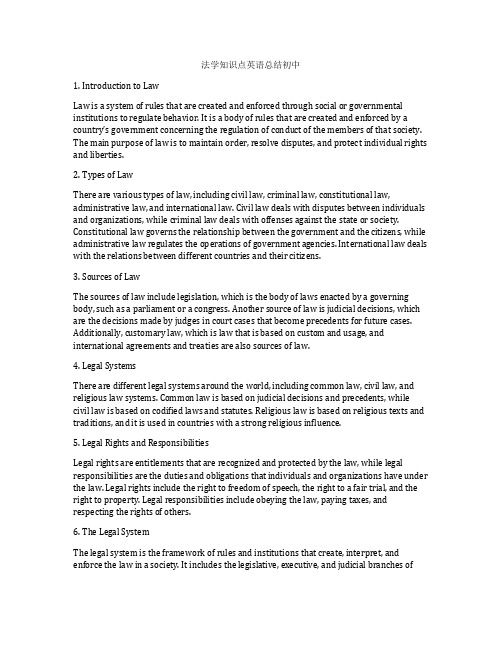
法学知识点英语总结初中1. Introduction to LawLaw is a system of rules that are created and enforced through social or governmental institutions to regulate behavior. It is a body of rules that are created and enforced by a country’s government concerning the regulation of conduct of the members of that society. The main purpose of law is to maintain order, resolve disputes, and protect individual rights and liberties.2. Types of LawThere are various types of law, including civil law, criminal law, constitutional law, administrative law, and international law. Civil law deals with disputes between individuals and organizations, while criminal law deals with offenses against the state or society. Constitutional law governs the relationship between the government and the citizens, while administrative law regulates the operations of government agencies. International law deals with the relations between different countries and their citizens.3. Sources of LawThe sources of law include legislation, which is the body of laws enacted by a governing body, such as a parliament or a congress. Another source of law is judicial decisions, which are the decisions made by judges in court cases that become precedents for future cases. Additionally, customary law, which is law that is based on custom and usage, and international agreements and treaties are also sources of law.4. Legal SystemsThere are different legal systems around the world, including common law, civil law, and religious law systems. Common law is based on judicial decisions and precedents, while civil law is based on codified laws and statutes. Religious law is based on religious texts and traditions, and it is used in countries with a strong religious influence.5. Legal Rights and ResponsibilitiesLegal rights are entitlements that are recognized and protected by the law, while legal responsibilities are the duties and obligations that individuals and organizations have under the law. Legal rights include the right to freedom of speech, the right to a fair trial, and the right to property. Legal responsibilities include obeying the law, paying taxes, and respecting the rights of others.6. The Legal SystemThe legal system is the framework of rules and institutions that create, interpret, and enforce the law in a society. It includes the legislative, executive, and judicial branches ofgovernment, as well as law enforcement agencies, courts, and legal professionals. The legal system ensures that the law is applied and enforced fairly and impartially.7. Legal ProfessionalsLegal professionals, such as lawyers, judges, and legal scholars, play a crucial role in the legal system. Lawyers provide legal advice and representation to clients, judges preside over court cases and make legal decisions, and legal scholars conduct research and analysis of legal issues. Legal professionals help ensure that the law is upheld and applied effectively.8. Criminal LawCriminal law is the branch of law that deals with offenses against the state or society. It includes crimes such as murder, theft, and assault, and it prescribes the punishment for those who commit such crimes. The purpose of criminal law is to maintain public order and safety, and to protect individuals and society from harm.9. Civil LawCivil law is the branch of law that deals with disputes between individuals and organizations. It includes cases such as contract disputes, property disputes, and family law matters. Civil law aims to provide a fair and just resolution to such disputes, and it often involves remedies such as monetary compensation or specific performance.10. Constitutional LawConstitutional law is the branch of law that governs the relationship between the government and the citizens. It includes the interpretation and application of the constitution, as well as the protection of fundamental rights and liberties. Constitutional law ensures that the government operates within the limits of its power and respects the rights of the citizens.11. Administrative LawAdministrative law is the branch of law that regulates the operations of government agencies. It includes the powers and duties of administrative agencies, as well as the procedures for administrative decision-making. Administrative law ensures that government agencies act within the law and are held accountable for their actions.12. International LawInternational law is the branch of law that deals with the relations between different countries and their citizens. It includes treaties, agreements, and conventions that govern international relations, as well as the resolution of disputes between countries. International law aims to promote peace and cooperation among nations.13. Legal EthicsLegal ethics is the code of conduct and professional responsibility that governs the behavior of legal professionals. It includes principles such as honesty, integrity, and confidentiality, as well as the duty to provide competent and zealous representation. Legal ethics ensures that legal professionals act ethically and in the best interests of their clients.14. The JudiciaryThe judiciary is the branch of government that interprets and applies the law through the court system. It includes judges who preside over court cases and make legal decisions, as well as the court staff and administration. The judiciary ensures that the law is upheld and justice is served.15. Legal ProcedureLegal procedure is the process by which legal disputes are resolved through the court system. It includes the filing of a lawsuit, the gathering of evidence, the presentation of arguments, and the rendering of a verdict. Legal procedure ensures that disputes are resolved fairly and according to the law.16. Legal EducationLegal education is the process of training and learning about the law and its principles. It includes law school, where students study the theory and practice of law, as well as professional training and continuing education for legal professionals. Legal education ensures that individuals are knowledgeable about the law and its applications.17. Legal ReformLegal reform is the process of making changes to the law and the legal system in order to improve its effectiveness and fairness. It includes legislation, court decisions, and administrative changes that aim to address shortcomings and promote justice. Legal reform ensures that the law evolves to meet the changing needs of society.In conclusion, law is a complex and multifaceted system that governs the behavior of individuals and society. It encompasses various branches and concepts, and it is essential for maintaining order, resolving disputes, and protecting individual rights and liberties. Understanding the key points and concepts of law is important for anyone seeking to navigate the legal system and contribute to a just and orderly society.。
法律英语

第一节法律基础知识elementary knowledge of laww 法律法令wsuit 诉讼3.jurist 法学家w court 法庭5.judiciary 司法的6.justice 公正司法7.statute 法规条例8.legal system 法系9.code 法典法规10.legislator 立法者11.magistrate 地方法官w-abiding 守法的13.attorney 律师w-breaker 犯法者15.solicitor 事务律师16.illegal 不合法的w-officer 检察长18.illegitimate 违法的不合法的19.trial 审讯审理key sentencesw consists largely of ought propositions prescribing how people ought tobehave. 法律由大部分规定人们应该怎样行为的强制性主张组成。
Proposition n观点主张建议提案命题Prescribe vt 开药方指示规定制定遵守2.the overall purpose of law is to achieve justice.达到正义被认为是法律的总目的。
3.some national legal systems are similar in certain respects and so can beclassified accordingly. 许多国家的法律体系在特定的方面相似,所以能被相应的分类。
DialogueI hear that case analysis is the basic teaching method in law class. 案例分析是法律课的基本教学法。
Case analysis =case study 案例分析Yes, school students learn the principles and historical development of the law through the close and detailed study of cases. 是的,法学院的学生能通过认真详细地虚席案例学习到法律的原则与历史发展。
英文法律知识点

英文法律知识点随着全球化趋势的加速,英语已经成为国际交流中最为普及和重要的语言之一。
不管是商务往来、国际合作还是留学移民,对英文法律知识的了解都显得至关重要。
在这篇文章中,我们将探讨一些常见的英文法律知识点,帮助读者更好地掌握和理解这一重要领域。
1. 合同法(Contract Law)合同法是英文法律体系中的关键部分,它规定了人们在购买商品、签订合作协议以及其他经济交易中的权利和义务。
在英文合同中,常见的术语包括offer(提议)、acceptance(接受)、consideration(对价)和breach(违约)等。
了解这些术语和相关法律规定,对于商务谈判和合同起草至关重要。
2. 知识产权法(Intellectual Property Law)知识产权法保护创作者和发明家的权益,包括专利、商标、版权和商业秘密等。
英文法律术语中,patent(专利)、trademark(商标)、copyright(版权)和infringement(侵权)等是我们需要熟悉的关键词汇。
尤其是在国际知识产权保护中,了解相关的法律制度和规定,对于维护自身权益至关重要。
3. 劳动法(Labor Law)劳动法涉及雇佣关系和劳动者权益保护。
英文法律术语中,常见的有employment contract(雇佣合同)、minimum wage(最低工资)、dismissal(解雇)和discrimination(歧视)等。
在员工与雇主之间发生纠纷时,对劳动法的了解能够帮助我们明确权益,并且寻求公正的解决方式。
4. 不动产法(Real Estate Law)不动产法涉及土地和建筑物的买卖、租赁和产权等问题。
在英文法律术语中,我们需要熟悉的词汇有property(财产)、title(产权)、mortgage(抵押)和tenancy agreement(租赁合同)等。
了解不动产法知识有助于我们在购买房产、租赁房屋或处理产权纠纷时,保护自身合法权益。
2024版《思想道德与法治》教材导读英文版

2024版《思想道德与法治》教材导读英文版2024 Edition "Ideology, Ethics, and Legal Studies" Textbook GuideWelcome to the guide for the 2024 edition of the "Ideology, Ethics, and Legal Studies" textbook! In this document, you will find a comprehensive overview of the key topics covered in the textbook, as well as some tips on how to navigate and make the most of your study experience.The textbook is designed to provide a deep understanding of the fundamental principles of ideology, ethics, and legal studies. It covers a wide range of topics, including the history of political thought, ethical theories, and the foundations of legal systems. By studying this textbook, you will gain valuable insights into the complex interplay between ideas, values, and laws in society.As you delve into the chapters of the textbook, you will encounter a diverse range of perspectives and arguments. It is important to approach each topic with an open mind and a critical eye, as this will help you to develop a nuanced understanding of the issues at hand. Make sure to engage actively with the material, asking questions and seeking clarification where needed.To get the most out of your study experience, we recommend creating a study schedule and setting aside dedicated time each day to read and reflect on the textbook. You may also find it helpful to form study groups with your peers, as this can provide additional insights and perspectives on the material.Overall, the 2024 edition of the "Ideology, Ethics, and Legal Studies" textbook is a valuable resource for students looking to deepen their understanding of these important fields. By approaching the material with curiosity and diligence, you will be well-equipped to navigate the complex landscape of ideas, values, and laws that shape our society.Good luck with your studies, and enjoy exploring the fascinating world of ideology, ethics, and legal studies!。
法学基础知识 英文

法学基础知识英文The Fundamentals of Legal Studies.The foundation of any legal system lies in its ability to provide a comprehensive understanding of the principles, values, and rules that govern society. Legal knowledge is not merely a collection of legal provisions and precedents; it is an intricate web of theories, concepts, andprinciples that shape the way we interpret and apply the law.1. Sources of Law.The starting point of legal studies is understanding the sources of law. These primarily include constitutions, statutes, regulations, treaties, and judicial decisions. Constitutions set out the fundamental principles and structure of a country's legal system, while statutes and regulations are enacted by legislative bodies to govern specific areas of law. Treaties are agreements betweenstates that create binding obligations, and judicial decisions interpret and apply the law to specific cases.2. Legal Systems.Different countries have different legal systems, with the two primary systems being civil law and common law.Civil law systems are based on codified laws, typically found in continental Europe, while common law systems rely on judicial decisions and precedents, primarily in England, the United States, and many other countries.3. Legal Principles.Legal principles are the guiding lights that shapelegal decision-making. These principles include the rule of law, which requires that all are subject to the law equally; the separation of powers, which divides government into distinct branches to prevent abuse of power; and the principle of legality, which stipulates that no one can be punished for an act that was not prohibited at the time it was committed.4. Legal Interpretation.Interpreting the law requires a deep understanding of legal language and the legal context. Judges, lawyers, and other legal professionals must interpret legal provisions, treaties, and judicial decisions to determine their meaning and application. This interpretation often involves considering the literal text, the legislative intent, and the broader context of the law.5. Legal Ethics.Legal ethics is an integral part of legal studies. Lawyers and judges are bound by ethical duties to uphold the integrity of the legal system, protect the rights of their clients, and maintain the highest standards of professional conduct. Breaches of legal ethics can lead to disciplinary action or even criminal liability.6. Legal Research.Legal research is a crucial skill for any legal professional. It involves examining legal materials, analyzing legal precedents, and applying legal principles to specific cases. Legal researchers must have a thorough understanding of the legal system, research methods, and the ability to synthesize information from various sources.7. Legal Practice.Legal practice encompasses a wide range of activities, including litigation, transactional work, legal advice, and more. Lawyers represent clients in court, draft and negotiate contracts, provide legal advice to businesses and individuals, and engage in various other legal activities. Legal practice requires a combination of legal knowledge, analytical skills, and client service.In conclusion, the fundamentals of legal studies provide a solid foundation for understanding and applying the law. They cover the sources of law, legal systems,legal principles, legal interpretation, legal ethics, legal research, and legal practice. This knowledge is essentialfor anyone seeking to understand and participate in the legal system, whether as a lawyer, judge, legal researcher, or simply as an informed citizen.。
法律知识导读(英文)第十三单元 约翰·罗尔斯

• absolutism 专制主义;绝对论
Notes
• Schock Prize(肖克奖):The Rolf Schock Prizes were established and endowed by bequest of philosopher and artist Rolf Schock (1933– 1986).
• His magnum opus, A Theory of Justice (1971) : the most important work in moral philosophy.
Байду номын сангаас
Words and Expressions
• magnum opus 代表作;巨著;杰作 • episcopalian 新教圣公会的 • summa cum laude (拉)最优等的;享有最高
• Original position (原初状态): The original position is a hypothetical situation developed by American philosopher John Rawls as a thought experiment to replace the imagery of a savage state of nature of prior political philosophers like Thomas Hobbes
parties to the original position know nothing about their particular abilities, tastes, and position within the social order of society.
法律知识分享作文英语
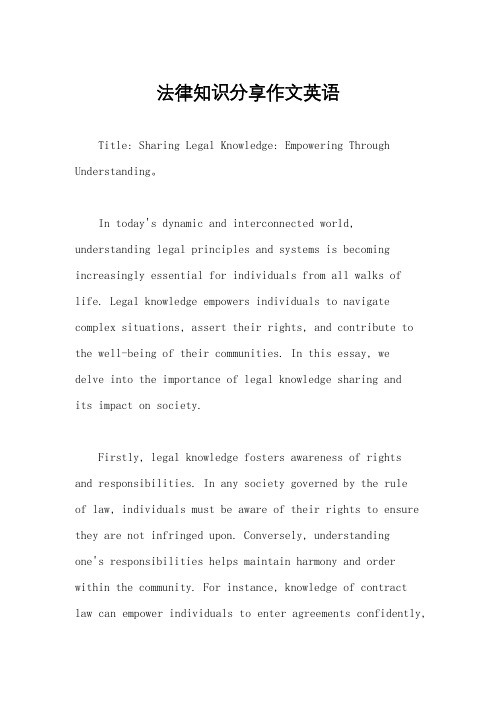
法律知识分享作文英语Title: Sharing Legal Knowledge: Empowering Through Understanding。
In today's dynamic and interconnected world, understanding legal principles and systems is becoming increasingly essential for individuals from all walks of life. Legal knowledge empowers individuals to navigate complex situations, assert their rights, and contribute to the well-being of their communities. In this essay, wedelve into the importance of legal knowledge sharing andits impact on society.Firstly, legal knowledge fosters awareness of rightsand responsibilities. In any society governed by the ruleof law, individuals must be aware of their rights to ensure they are not infringed upon. Conversely, understandingone's responsibilities helps maintain harmony and order within the community. For instance, knowledge of contract law can empower individuals to enter agreements confidently,knowing their rights and obligations. Similarly, understanding criminal law can inform citizens about their rights when interacting with law enforcement agencies.Moreover, legal knowledge promotes social justice and equality. By understanding the principles of equity and justice, individuals can identify and challenge instances of discrimination, injustice, or abuse of power. For example, knowledge of human rights laws enables individuals to advocate for marginalized groups and hold authorities accountable for their actions. This not only safeguards individual liberties but also contributes to building a more just and equitable society.Furthermore, legal knowledge enhances problem-solving skills and critical thinking. Legal reasoning requires individuals to analyze complex situations, weigh evidence, and arrive at logical conclusions. These skills are not only valuable in legal contexts but also in various aspects of personal and professional life. For instance, understanding legal principles can help entrepreneurs make informed business decisions, mitigate risks, and navigateregulatory frameworks effectively.Additionally, legal knowledge fosters civic engagement and participation. In democratic societies, informed citizens play a crucial role in shaping public policies and holding elected representatives accountable. Understanding the legal framework of governance enables individuals to engage meaningfully in civic activities such as voting, advocacy, and community organizing. This active participation strengthens democracy and ensures that the voices of the people are heard in matters of governance.Moreover, legal knowledge contributes to conflict resolution and peacebuilding. By understanding alternative dispute resolution mechanisms such as mediation and arbitration, individuals can resolve conflicts amicably without resorting to litigation. This not only reduces the burden on the judicial system but also promotes reconciliation and mutual understanding among parties involved in disputes. In contexts of social or political conflict, legal knowledge can facilitate dialogue and negotiation, ultimately leading to peaceful resolutions.In conclusion, sharing legal knowledge is vital for empowering individuals, promoting justice, and fostering social cohesion. By enhancing awareness, promoting equality, and fostering critical thinking, legal education equips individuals with the tools they need to navigate the complexities of the modern world. Therefore, efforts to democratize legal knowledge through education, community outreach, and public awareness campaigns are essential for building inclusive and equitable societies where the ruleof law prevails.。
初一英语法律常识单选题50题
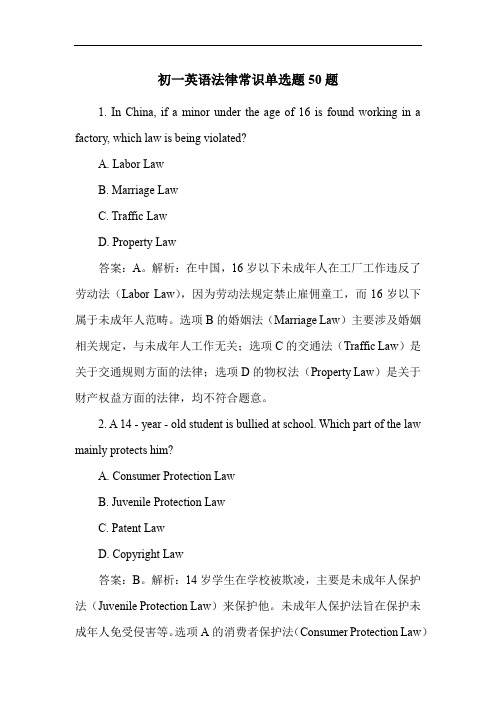
初一英语法律常识单选题50题1. In China, if a minor under the age of 16 is found working in a factory, which law is being violated?A. Labor LawB. Marriage LawC. Traffic LawD. Property Law答案:A。
解析:在中国,16岁以下未成年人在工厂工作违反了劳动法(Labor Law),因为劳动法规定禁止雇佣童工,而16岁以下属于未成年人范畴。
选项B的婚姻法((Marriage Law)主要涉及婚姻相关规定,与未成年人工作无关;选项C的交通法((Traffic Law)是关于交通规则方面的法律;选项D的物权法(Property Law)是关于财产权益方面的法律,均不符合题意。
2. A 14 - year - old student is bullied at school. Which part of the law mainly protects him?A. Consumer Protection LawB. Juvenile Protection LawC. Patent LawD. Copyright Law答案:B。
解析:14岁学生在学校被欺凌,主要是未成年人保护法(Juvenile Protection Law)来保护他。
未成年人保护法旨在保护未成年人免受侵害等。
选项A的消费者保护法((Consumer Protection Law)是关于保护消费者权益的,与校园欺凌无关;选项C的专利法((Patent Law)是关于专利相关的法律;选项D的版权法((Copyright Law)是关于版权方面的,均与校园欺凌的保护无关。
3. According to the law, a 13 - year - old child has the right to ______.A. V ote in the national electionB. Get compulsory educationC. Drive a car on the roadD. Sign a business contract independently答案:B。
学法14单元英语作文
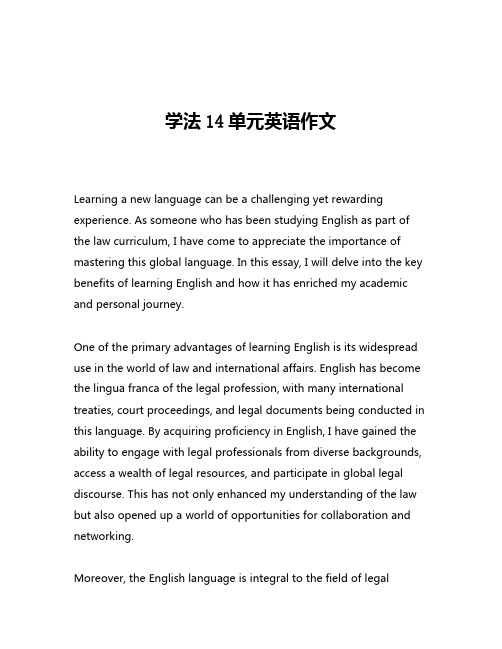
学法14单元英语作文Learning a new language can be a challenging yet rewarding experience. As someone who has been studying English as part of the law curriculum, I have come to appreciate the importance of mastering this global language. In this essay, I will delve into the key benefits of learning English and how it has enriched my academic and personal journey.One of the primary advantages of learning English is its widespread use in the world of law and international affairs. English has become the lingua franca of the legal profession, with many international treaties, court proceedings, and legal documents being conducted in this language. By acquiring proficiency in English, I have gained the ability to engage with legal professionals from diverse backgrounds, access a wealth of legal resources, and participate in global legal discourse. This has not only enhanced my understanding of the law but also opened up a world of opportunities for collaboration and networking.Moreover, the English language is integral to the field of legalresearch and scholarship. A significant portion of the world's legal literature, including academic journals, textbooks, and case law, is published in English. By mastering the language, I have been able to delve deeper into legal theories, analyze case studies, and stay abreast of the latest developments in the field. This has been instrumental in sharpening my critical thinking skills, expanding my knowledge base, and contributing to my overall academic success.Beyond the professional realm, learning English has also enriched my personal life. The ability to communicate effectively in English has allowed me to engage with a broader global community, fostering cross-cultural understanding and appreciation. I have had the opportunity to connect with individuals from different parts of the world, exchange ideas, and learn about diverse perspectives. This has not only broadened my horizons but also cultivated a greater sense of empathy and cultural sensitivity – qualities that are highly valued in the legal profession.Furthermore, the process of learning English has challenged me to step out of my comfort zone and embrace new ways of thinking and expressing myself. Navigating the nuances of grammar, vocabulary, and idiomatic expressions has pushed me to be more adaptable, creative, and resilient. This has translated into improved problem-solving skills, enhanced communication abilities, and a greater appreciation for the complexities of language.It is also worth noting that proficiency in English can open up a world of educational and professional opportunities. Many prestigious universities and law schools around the globe use English as the primary language of instruction, and being able to excel in this language can significantly enhance one's chances of gaining admission and thriving in these academic settings. Additionally, in an increasingly globalized job market, employers often seek individuals with strong English language skills, as it facilitates effective communication, collaboration, and the ability to work in diverse, multinational environments.However, the journey of learning English has not been without its challenges. Mastering a new language requires dedication, persistence, and a willingness to step out of one's linguistic comfort zone. There have been moments of frustration, confusion, and self-doubt, as I navigated the complexities of English grammar, pronunciation, and idiomatic expressions. But through consistent practice, exposure to English-language media, and the guidance of dedicated instructors, I have been able to overcome these obstacles and steadily improve my proficiency.One of the key strategies that has aided my English language learning journey is the adoption of a growth mindset. Rather than viewing mistakes or setbacks as failures, I have learned to embracethem as opportunities for growth and learning. I have actively sought feedback, engaged in constructive discussions, and remained open to new approaches and techniques. This mindset has not only enhanced my language skills but has also cultivated a sense of resilience and adaptability that will serve me well in my future academic and professional endeavors.In conclusion, learning English as part of the law curriculum has been a transformative experience. It has equipped me with the linguistic tools to navigate the legal profession, engage in cutting-edge research, and connect with a global community. While the journey has been challenging at times, the benefits of mastering this language have been immeasurable. As I continue to refine my English language skills, I am confident that they will continue to be a valuable asset in my academic and professional pursuits, as well as in my personal growth and development. The investment of time and effort in learning English has undoubtedly been a worthwhile one, and I am grateful for the opportunities it has afforded me.。
八年级法律知识英语阅读理解20题

八年级法律知识英语阅读理解20题1<背景文章>The Law on the Protection of Minors is of great significance. It aims to protect the legitimate rights and interests of minors. Minors are those who are under the age of eighteen. This law provides protection in many aspects. For example, it ensures that minors have the right to education. Schools and parents are responsible for providing minors with quality education. It also protects minors from abuse and neglect. Any form of abuse or neglect towards minors is strictly prohibited. Moreover, the law guarantees minors' right to health. Adequate medical care and a healthy living environment are essential for minors' growth.The implementation of the Law on the Protection of Minors is crucial for the healthy development of minors. It helps create a safe and supportive environment for them to grow up. By protecting their rights and interests, minors can develop into responsible and productive members of society.1. The Law on the Protection of Minors is for those who are under the age of ___.A. sixteenB. seventeenC. eighteenD. nineteen答案:C。
英语法律知识点大全

英语法律知识点大全引言英语作为一种全球通用语言,不仅在日常生活、商务交流中扮演重要角色,而且在法律领域也有着广泛的应用。
掌握一些英语法律知识点,对于提高自身法律素养、扩展国际交流能力具有重要意义。
本文将为你介绍一些常见的英语法律知识点。
合同法合同在法律中扮演着重要的角色,它规定了参与方相互约定的权利和义务。
以下是一些与合同相关的英语法律知识点:1. Offer and acceptance (要约和承诺)在合同形成过程中,一方向另一方发出的写实或口头的要约称为offer,另一方对此作出同意称为acceptance。
只有offer和acceptance达成一致,合同才能成立。
2. Consideration(对价)合同的有效性通常要求有一定的对价存在。
对价可以是金钱、商品或服务等对方愿意接受的内容。
3. Breach of contract(违约)当一方未能履行合同中规定的义务时,就构成了合同违约。
在违约情况下受损方通常可以追究违约方的法律责任。
著作权法著作权保护了创作者对其原创作品的权益。
以下是一些著作权法方面的英语法律知识点:1. Copyright(版权)著作权保护包括文学、艺术、音像、电脑软件等作品。
一旦著作品被创建,即自动拥有其版权。
2. Fair use(合理使用)合理使用是指在符合某些限制条件下,非授权使用他人著作的权利,例如学术研究、评论和新闻报道等。
3. Infringement(侵权)未经版权拥有者的许可,擅自制作、复制、发行他人作品都属于侵权行为。
知识产权法知识产权涉及到商标、专利和工业设计等方面。
以下是一些与知识产权法相关的英语法律知识点:1. Trademark(商标)商标用于识别来源于特定企业的商品或服务,它可以是标志、名称、声音或颜色等。
2. Patent(专利)专利授予发明者对其发明的独特权利,确保其在一段时间内独占市场。
3. Industrial design(工业设计)工业设计保护产品的外观,使其不被未经许可的抄袭。
九年级英语法律常识入门单选题50题
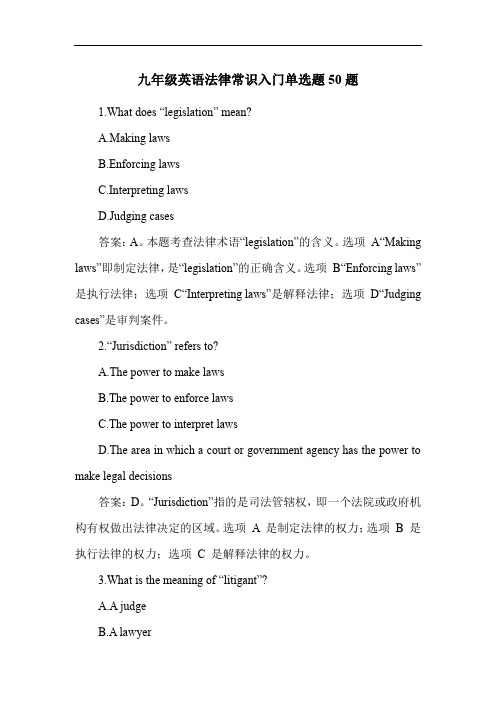
九年级英语法律常识入门单选题50题1.What does “legislation” mean?A.Making lawsB.Enforcing lawsC.Interpreting lawsD.Judging cases答案:A。
本题考查法律术语“legislation”的含义。
选项A“Making laws”即制定法律,是“legislation”的正确含义。
选项B“Enforcing laws”是执行法律;选项C“Interpreting laws”是解释法律;选项D“Judging cases”是审判案件。
2.“Jurisdiction” refers to?A.The power to make lawsB.The power to enforce lawsC.The power to interpret lawsD.The area in which a court or government agency has the power to make legal decisions答案:D。
“Jurisdiction”指的是司法管辖权,即一个法院或政府机构有权做出法律决定的区域。
选项A 是制定法律的权力;选项B 是执行法律的权力;选项C 是解释法律的权力。
3.What is the meaning of “litigant”?A.A judgeB.A lawyerC.A person involved in a lawsuitD.A lawmaker答案:C。
“litigant”是诉讼当事人的意思。
选项A 是法官;选项B 是律师;选项D 是立法者。
4.“Precedent” means?A.A new lawB.An old lawC.A legal decision that serves as an example for future casesD.A legal theory答案:C。
法律知识导读(英文)第十三单元 约翰·罗尔斯

•
------ A Theory of Justice is a work of
political philosophy and ethics by John Rawls. It
was originally published in 1971 and revised in both
1975 (for the translated editions) and 1999.
• His magnum opus, A Theory of Justice (1971) : the most important work in moral philosophy.
Words and Expressions
• magnum opus 代表作;巨著;杰作 • episcopalian 新教圣公会的 • summa cum laude (拉)最优等的;享有最高
• Justice as Fairness(公平的正义):Justice as Fairness: Political not Metaphysical is an essay by John Rawls, published in 1985. In it he describes his conception of justice.
• The term 'reflective equilibrium' was coined by John Rawls and popularized in his A Theory of Justice as a method for arriving at the content of the principles of justice.
parties to the original position know nothing about their particular abilities, tastes, and position within the social order of society.
- 1、下载文档前请自行甄别文档内容的完整性,平台不提供额外的编辑、内容补充、找答案等附加服务。
- 2、"仅部分预览"的文档,不可在线预览部分如存在完整性等问题,可反馈申请退款(可完整预览的文档不适用该条件!)。
- 3、如文档侵犯您的权益,请联系客服反馈,我们会尽快为您处理(人工客服工作时间:9:00-18:30)。
Philosophical method • Mainly by analytic, and especially linguistic,
philosophy.
Other work • Causation in the Law (1959, With Tony
Honoré), which is regarded as one of the important academic discussions of Causation in the legal context.
• A distinction between the internal and external points of view of law and rules.
◆ A late reply (published as a postscript to the second edition) to Ronald Dworkin, who criticized legal positivism in Taking Rights Seriously (1977), A Matter of Principle (1985) and Law's Empire (1986)
Ideas:
• A critique of John Austin's theory: law is the command of the sovereign backed by the threat of punishment.
• A distinction between primary and secondary legal rules: a primary rule governs conduct and a secondary rule allows the creation, alteration, or extinction of primary rules.
• Law, Liberty and Morality (1963) and The Morality of the Criminal Law (1965)
Words and Expressions
• chancery (英)大法官法庭;(美)横平法庭 • Middle Temple 中殿律师学院(英国伦敦培养律
◆ Many of his students are important legal, moral, and political philosophers: Brian Barry, John Finnis, Kent Greenawalt, Neil MacCormick, Joseph Raz, Chin Liew Ten, W. J. Waluchow, and Ronald Dworkin.
师的组织之一) • jurist 法学家;法官;律师 • postscript 附言;又及 • presage 预感;预言 • causation 原因;因果关系 • decriminalization 合法化;非刑事化
H. L. A. Hart
• ------Herbert Lionel Adolphus Hart (18 July 1907 – 19 December 1992) was an influential legal philosopher of the 20th century. He was Professor of Jurisprudence at Oxford University and the Principal of Brasenose College, Oxford. His most famous work is The Concept of Law (1961).
Biographical sketch • Born in 1907, Educated at Cheltenham College,
Bradford Grammar School and at New College, Oxford. • Becaming a Barrister and practised successfully at the Chancery Bar from 1932 to 1940. • During World War II, Hart worked with MI5, a division of British military intelligence. • In 1952, he was elected Professor of Jurisprudence at Oxford. He retired from the Chair in 1969.
法律知识导读(英文)第十四单元 H. L. A. Hart
Lead-in
• H. L. A. 哈特(1907年7月18日-1992年12月19 日),英国著名法理学家,新分析法学派首创人, 是20世纪最重要的法律哲学家之一。他曾长期任 牛津大学法理学教授,主要著作有《法律的概念》 (1961)、《法、自由和道德》(1963)和《刑 法的道德性》(1965)等。他的学说和H.凯尔森 的纯粹法学构成了20世纪分析实证主义法学中的 两派。哈特的贡献在于以语言分析哲学为基础, 重新挽救了在二战后饱受批评的分析实证法学, 其两位学生拉兹与麦考米也是新分析实证法学派 的代表人物。
• He combined the areful analysis of twentiethcentury analytic philosophy with the jurisprudential tradition of Jeremy Bentham.
The Concept of Law
The Concept of Law developed a sophisticated view of legal positivism.
